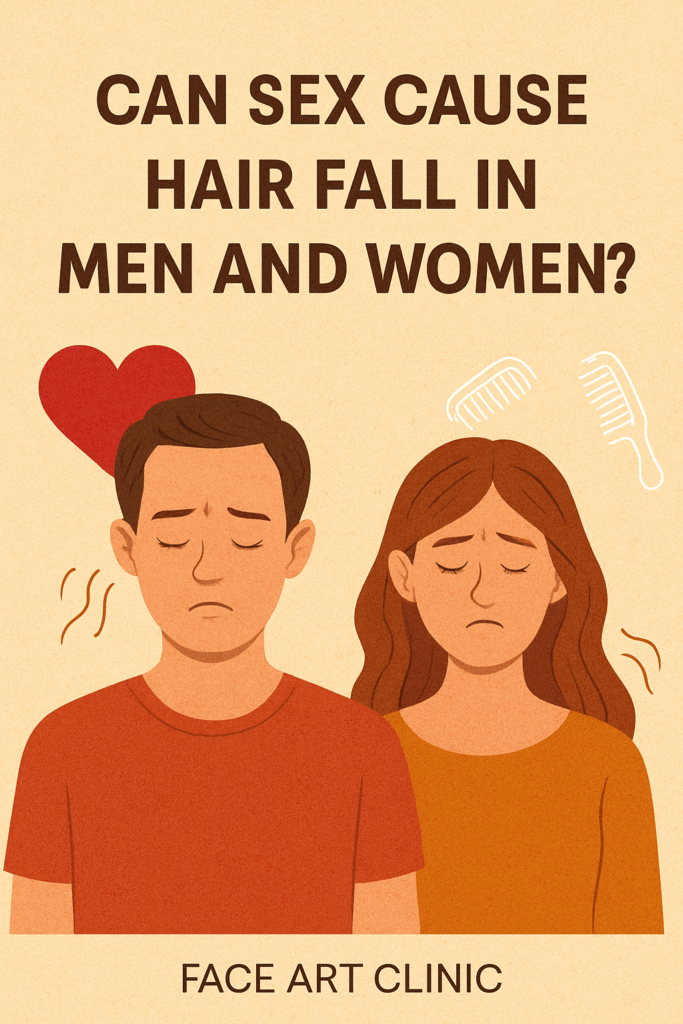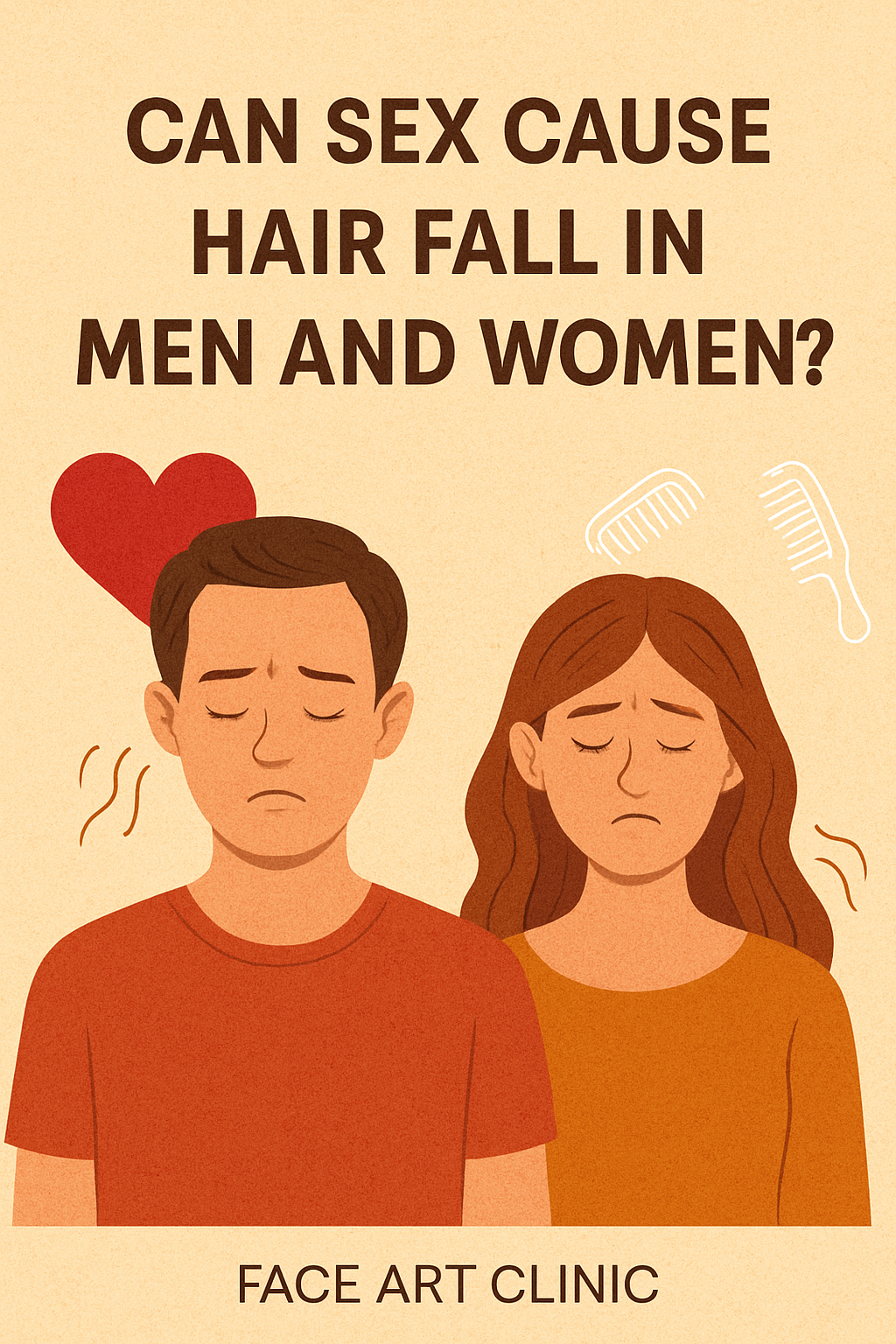
Hair loss is a common concern among both men and women. People often link it to genetics, stress, poor diet, or hormonal imbalance. But one question that frequently comes up is – “Can sex cause hair fall?” This blog dives deep into the science behind sexual activity and its possible connection with hair fall, separating myths from facts. Let’s explore whether sex really affects your hair health, and what you should do about it.
Table of Contents
- Understanding Hair Growth Cycle
- Hormones and Their Role in Hair Health
- Does Sex Affect Hormone Levels?
- Sex and Hair Fall in Men
- Sex and Hair Fall in Women
- Sexual Frequency vs. Hair Health
- Does Masturbation Cause Hair Fall?
- Other Lifestyle Factors That Affect Hair
- Tips to Prevent Hair Loss
- Conclusion: Is Sex Really to Blame?
- Consult the Experts at Face Art Clinic
Understanding Hair Growth Cycle
To understand hair fall, you must first know how the hair growth cycle works. Hair grows in 4 main phases:
- Anagen (Growth Phase) – Lasts 2–7 years
- Catagen (Transition Phase) – Lasts 2–3 weeks
- Telogen (Resting Phase) – Lasts ~3 months
- Exogen (Shedding Phase) – Hair falls and new hair begins to grow
On average, a person sheds 50–100 hairs per day. Hair loss becomes a concern only when it exceeds this range or when new hair doesn’t grow back.
Hormones and Their Role in Hair Health
Hormones have a direct impact on hair health. The key hormones involved are:
- Testosterone
- Dihydrotestosterone (DHT) – A by-product of testosterone
- Estrogen
- Progesterone
- Cortisol (stress hormone)
High levels of DHT can shrink hair follicles, especially in men, causing androgenic alopecia (pattern baldness). Estrogen, on the other hand, promotes hair growth in women.
Does Sex Affect Hormone Levels?
Yes, sex causes temporary changes in hormone levels. During or after sexual activity:
- Testosterone rises in both men and women
- Endorphins and oxytocin increase (the feel-good hormones)
- Cortisol decreases, reducing stress
These hormonal shifts are generally short-term and return to baseline after a while.
Sex and Hair Fall in Men
Men produce more testosterone, so they are more vulnerable to DHT-induced hair fall. Some men worry that frequent sex increases testosterone, which increases DHT, leading to hair loss.
However, here are the facts:
- Sex does increase testosterone, but temporarily.
- This spike is not enough to cause excessive hair fall.
- Genetics play a much larger role in male pattern baldness.
In short, sex is not the cause of hair fall in healthy men. But, overtraining, poor nutrition, or excessive stress due to lifestyle habits (including obsessive sexual behavior) might play a role indirectly.
Sex and Hair Fall in Women
Women experience hormonal changes during sex, but these are milder compared to men.
- Sex doesn’t significantly raise testosterone or DHT levels in women.
- Estrogen, which supports hair growth, may even increase with regular sexual activity.
- In fact, regular intimacy can reduce stress, improving scalp health.
So, for women, sex is unlikely to cause hair loss unless they have an underlying hormonal imbalance like PCOS or thyroid disorders.
Sexual Frequency vs. Hair Health
There is no scientific evidence suggesting that having sex frequently (or not at all) causes hair fall. But consider these points:
- Excessive sexual activity may lead to fatigue, low energy, or even stress in some people.
- Lack of sleep after frequent sex can trigger stress-related hair fall.
- But moderate, healthy sexual activity can be beneficial for emotional well-being and stress reduction.
Balance is key.
Does Masturbation Cause Hair Fall?
This is a very common myth – especially in young men.
The truth:
- Masturbation does not cause hair fall.
- It does not reduce protein or testosterone levels to a harmful extent.
- Excessive guilt or stress around masturbation may impact mental health, which can indirectly contribute to hair loss.
The key is again — moderation and a healthy mindset.
Other Lifestyle Factors That Affect Hair
Sex is not the main culprit in most hair fall cases. More important factors include:
- Poor diet (low protein, iron, vitamins)
- Stress and anxiety
- Lack of sleep
- Hormonal imbalances (PCOS, thyroid)
- Smoking and alcohol abuse
- Use of harsh chemical hair products
Improving these factors often reduces hair fall more effectively than worrying about sexual activity.
Tips to Prevent Hair Loss
Whether you’re sexually active or not, here’s how to protect your hair:
- Eat a high-protein, vitamin-rich diet
- Manage stress with meditation, yoga, or therapy
- Avoid frequent heat styling or harsh chemicals
- Use DHT-blocking shampoos if you have androgenic alopecia
- Sleep at least 7–8 hours a night
- Consult a dermatologist or hair expert for early signs of hair thinning
Conclusion: Is Sex Really to Blame?
No. Sex does not cause hair fall. Neither occasional intimacy nor regular sexual activity is harmful to your hair. In fact, sex can improve mood, reduce stress, and promote overall health — all of which support good hair growth.
However, if you are noticing significant hair loss, it’s best to look deeper — diet, genetics, medical conditions, or stress are more likely causes.
Consult the Experts at Face Art Clinic
At Face Art Clinic, Kolhapur, we help you identify the real reason behind your hair fall and offer personalized treatments that are safe and effective. Whether it’s hair transplant, PRP therapy, mesotherapy, or medical management — we have it all under one roof.
📍 Address: Csiber Chowk, Kolhapur
📞 Phone Numbers: 9405622455, 7758976097
🌐 Website: https://faceart.co.in/
▶️ YouTube: https://youtube.com/@faceartclinic
Book your consultation today and let our experts bring your confidence back — hair by hair.
